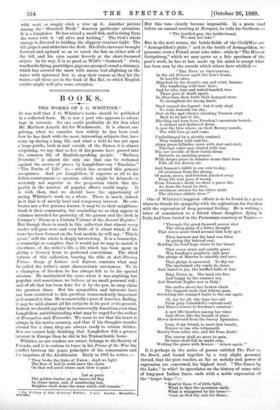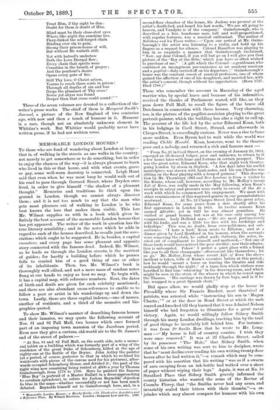BOOKS.
THE WORKS OF J. G. WHITTIER.*
IT was well that J. G. Whittier's works should be published
in a collected form. He is not a poet who appears to advan- tage in extracts. No one could profitably do for him what Mr. Matthew Arnold did for Wordsworth. It is almost sur- prising, when we consider how widely he has been read, bow he has dealt with the most interesting subjects that have come up during a long life, and what a hold he has got upon a large public, both in and outside of the States, it is almost surprising, we say, that so few of his poems have passed into the common life of English-speaking people. " Barbara. Frietchie " is almost the only one that can be reckoned against the scores of pieces by Longfellow—as " Excelsior," " The Psalm of Life," &c.—which has secured this general acceptance. And yet Longfellow, if superior at all to his fellow-countryman—a question which might be debated—is certainly not superior in the proportion which this dis- parity in the number of popular efforts would imply. It is well, then, that we should have the opportunity of seeing Whittier's work as a whole. There is much, indeed, in it thal is of merely local and temporary interest. He cele- brates not a few persons, known, it may be, to their neighbour- hood or their community, but reminding us, as they appear in volumes intended for posterity, of the parson and the clerk in Cowper's "Poem on a Certain Volume of the Annual Register." But though there is much in this collection that almost every reader will pass over, and very little of it about which, if his taste has been formed on the best models, he will say, " This is great," still the whole is deeply interesting. It is a transcript, a transcript so complete that it would not be easy to match it elsewhere, of the writer's life, a life which has been spent in giving a literary form to profound convictions. The third volume of this collection, bearing the title of Anti-Slavery Poems : Songs of Labour and Reform, contains what may be called the writer's most characteristic utterances. To be a champion of freedom he has always felt to be his special mission. He maintained the cause when it was anything but popular, and sometimes, we believe, at no small personal risk ; and of all that has been done for it by the pen, he may claim the greatest share. But his sympathies and interests have not been restricted to this question, transcendently important as it seemed to him. He is essentially a poet of America, finding, it may be said, almost all his subjects in its past or its present. Indeed, we should say that he is more really American even than Longfellow, notwithstanding what may be urged for the author of Evangeline and Hiawatha. We seem to see that his heart is always in his native country, and that if his thoughts wander abroad for a time, they are always ready to return thither. But one cannot help thinking that Longfellow felt a greater interest in Europe than he did in his Transatlantic home.
Whittier, as our readers are aware, belongs to the Society of Friends, and it is curious to trace in his Poems of the War the conflict between the peace principles of his communion and the impulses of the Abolitionist. Early in 1861 he writes :—
" They broke the links of Union : shall we light The fires of hell to weld anew the chain On that red anvil where each blow is pain
Let us press The golden cluster on our brave old flag In closer union, and, if numbering less, Brighter shall shine the stars which still remain."
• The Writing of John Greenleaf Whittier. 7 vols. London : Macmillan. 18%4889.
But this tone clearly became impossible. In a poem read before an annual meeting at Newport, he tells his brethren:-
" The levelled gun, the battle-brand, We may not take."
But in the next stanza, the battle-fields of the Civil]War are "Armageddon's plain ;" and in the battle of Armageddon, we presume, even a Friend must take sides : while in " The Hive at Gettysburg," which we may quote as a fair specimen of the poet's work, he has at last made up his mind to accept what has been won by the swords which others have wielded
THE lifvz AT GETTYSBURG.
In the old Hebrew myth the lion's frame, So terrible alive, Bleached by the desert's sun and wind, became The wandering wild bees' hive ; And he who, lone and naked-handed, tore Those jaws of death apart, In after-time drew forth their honeyed store To strengthen his strong heart.
Dead seemed the legend : but it only slept To wake beneath our sky; Just on the spot whence ravening Treason crept Back to its lair to die, Bleeding and torn from Freedom's mountain bounds, A stained and shattered drum Is now the hive where, on their flowery rounds, The wild bees go and come.
Unchallenged by a ghostly sentinel, They wander wide and far, Along green hillsides, sown with shot and shell, Through vales once choked with war. The low reveille of their battle-drum Disturbs no morning prayer ; With deeper peace in summer noons their hum Fills all the drowsy air.
And Samson's riddle is our own to-day, Of sweetness from the strong, Of union, peace, and freedom plucked away From the rent jaws of wrong. From Treason's death we draw a purer life, As, from the beast he slew, A sweetness sweeter for his bitter strife The old-time athlete drew !"
One of Whittier's happiest efforts is to be found in a poem where he blends his sympathy with the aspirations for freedom with the expression of deep personal feeling. He is writing a letter of consolation to a friend whose daughter, dying in Italy, had been buried in the Protestant cemetery at Naples :—
"Through thy great farewell sorrow shot The sharp pang of a bitter thought That slaves must tread around that holy spot.
Thou knewest not the land was blest In giving thy beloved rest, Holding the fond hope closer to her breast That every sweet and saintly grave Was freedom's prophecy, and gave The pledge of Heaven to sanctify and save.
That pledge is answered. To thy ear The unchained city sends its cheer, And, tuned to joy, the muffled bells of fear Ring Victor in. The land sits free And happy by the summer sea, And Bourbon Naples now is Italy !
She smiles above her broken chain The languid smile that follows pain, Stretching her cramped limbs to the sun again.
Oh, joy for all, who hear her call From gray Camaldoli's convent-wall And Elmo's towers to freedom's carnival !
A new life breathes among her vines And olives, like the breath of pines Blown downward from the breezy Apennines.
Lean, 0 my friend, to meet that breath, Rejoice as one who witnesseth Beauty from ashes rise, and life from death !
Thy sorrow shall no more be pain. Its tears shall fall in sunlit rain, Writing the grave with flowers : Arisen again !"
It is perhaps in the series of poems entitled The Tent on the Beach, and bound together by a very slight personal thread, that the poet reaches, as far as melody and power of expression are concerned, his highest level. " The Grave by the Lake," in whic!, he speculates on the history of some relic
of long-past Indian times, ends with a noble expression of the " larger hope :"—
"Hear'st thou, 0 of little faith, What to thee the mountain saith, What is whispered by the trees ?— Cast on God thy care for these ; Trust Him, if thy sight be dim : Doubt for them is doubt of Him.
Blind must be their close-shut eyes Where like night the sunshine lies, Fiery-linked the sell-forged chain Binding ever sin to pain, -Strong their prison-house of will, But without He waiteth still.
Not with hatred's undertow Doth the Love Eternal flow ; Every chain that spirits wear Crumbles in the breath of prayer ; And the penitent's desire Opens every gate of fire.
Still Thy love, 0 Christ arisen,
Yearns to reach these souls in prison : Through all depths of sin and loss Drops the plummet of Thy cross ! Never yet abyss was found Deeper than that cross could sound !' "
Three of the seven volumes are devoted to a collection of the writer's prose works. The chief of them is Margaret Smith's Journal, a picture of the New England of two centuries ago, with now and then a touch of humour in it. Humour is a rare, though not an absolutely unknown element in Whittier's work. But Whittier would probably never have written prose, if he had not written verse.







































 Previous page
Previous page